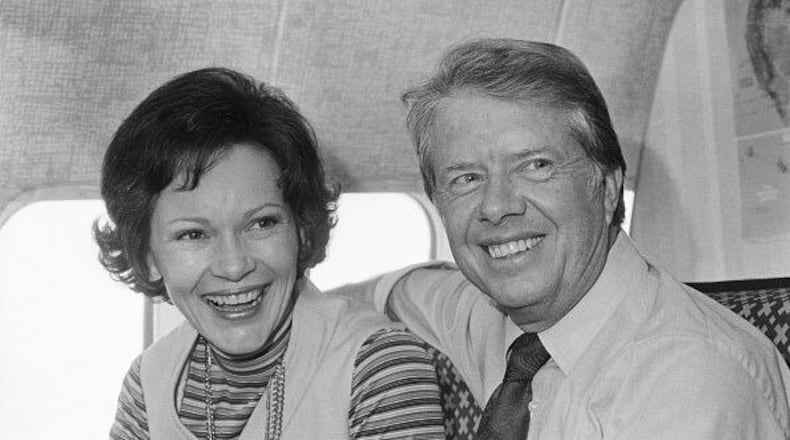As we approach almost half a century since Jimmy Carter was elected president in 1976, the timing is right to reevaluate his place in history. His and Rosalynn’s legacy will be, as he wished it to be, peace and human rights. As more scholars, journalists and memoirists examine primary evidence and place the Carters in the context of their times, the image of two of the greatest peacemakers of their era emerges.
The turning point in Carter’s life came in 1953 when his father “Mr. Earl” Carter died. Returning to Plains, after resigning from the U.S. Navy to take charge of the family business, Carter was shocked to discover that his father had been quietly giving aid to poor and needy people, both Blacks and whites.
Although undoubtedly motivated by Christian principles, but also driven by the expectations of his father, Carter vowed that he would do as much good for as many people as possible for as long as possible. He bucked the archaic politics of his state and the restrictions of the Jim Crow era to win a state senate seat in 1962. When he won the governorship in 1970, he shocked the state and the nation by declaring that the time for racial discrimination in Georgia was over. Practicing what he preached, he favored policies that delivered justice and equality to all citizens, rich and poor, healthy, or handicapped, Black, or white and he hung a portrait of Rev. Martin Luther King Jr., in the state Capitol.
Credit: contributed
Credit: contributed
Rosalynn became his perfect complement and truly equal partner. As First Lady, she went on a diplomatic tour of Latin America with the authority of the president, and she was involved in virtually every political and policy decision of the presidency.
Her work to improve care for the mentally challenged resulted in improved laws during the White House years and significant progress for decades afterward. The media-made and politically fueled myths that flourished around the Carters obscured the truth of what they did. With extraordinary political courage they attacked two of the most difficult issues: he, peace in the Middle East; and she, care and justice for the mentally challenged.
Carter may well have lusted in his heart, but certainly that poor little rabbit was no killer and the alleged “malaise” speech never mentioned that word but was a statesmanlike address about the fuel crisis and the mood of the country. Although politically damaging, it was another expression of how Carter sought solutions to the energy crisis by promoting solar and nuclear energy as well is searching for other alternatives to the use of petroleum.
Getting very little credit for what he did, he nevertheless reached across the aisle for bipartisan support for the Panama Canal treaties and negotiated an arms limitations treaty with the Soviet Union at the same time he normalized relations with China. While using the economic pressure of giving and taking away foreign aid, Carter also practiced his unique style of personal diplomacy. With Rosalynn’s help, as well as that of Aliza Begin and Jehan Sadat, he accomplished the miracle of the Camp David Accords, a framework for peace between Israel and Egypt. He not only pressured a Latin American dictator to release thousands of political prisoners, and other dictators to do likewise, he persuaded the Soviet Union to free Jewish dissidents who languished in concentration camps or merely wished to emigrate to Israel.
War, Carter said, was the ultimate violation of human rights. As president, he kept the U.S. out of all wars while at the same time building the military back to the most powerful in the world and promising to use it if necessary. If for no other reason, Carter should be revered for keeping the peace during his presidency and dedicating much of his long post-presidency to ending conflicts in the Middle East and around the world.
With many cards stacked against him in the presidential election of 1980, Carter went down in defeat by Republican Ronald Reagan. Now we know that among the hidden reasons at that time, no one knew that Carter had completed the negotiations that would set free the American hostages in Iran. The Republican campaign, however, masterminded by William Casey, cut a deal with the Iranians to hold the hostages until after the election, which would guarantee Carter’s defeat.
Refusing to accept defeat, Jimmy and Rosalynn Carter used the presidency as a steppingstone to a long post-presidential career where they cemented their legacy of peace and human rights. Although most famous for their work with Habitat for Humanity, they also established the Carter Center to wage peace, fight disease and promote democracy, as well as the Rosalynn Carter Institute for Caregivers.
Ultimately, they flew into the face of mortality itself by living a healthy lifestyle that’s given them long lives, and also by creating the two institutions that would continue their work for many generations to come.
Their place in history is secure. They have earned all the love and respect that the world can possibly muster to give to them.
E. Stanly Godbold Jr., a university professor emeritus, is author of “Jimmy and Rosalynn Carter: The Georgia Years, 1924-1974″ and “Jimmy and Rosalynn Carter: Power and Human Rights, 1975-2020.”
About the Author
Keep Reading
The Latest
Featured



